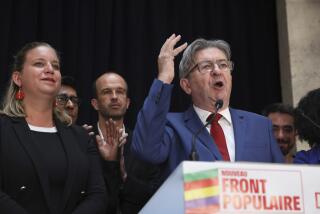Unity still eludes France’s Socialist Party
- Share via
Reporting from Paris — France’s sometimes fractious Socialist Party, often seen as the likeliest party to unseat President Nicolas Sarkozy in 2012, emerged from its annual conference Sunday with no damaging public divisions yet with few shared answers on how to modernize its economic program to adapt to current fiscal conditions.
Despite several recent victories, Sarkozy remains unpopular. Yet the Socialists suffer from an image as a divided clan, and the ongoing European debt crisis and France’s growing deficit fears have only made the jobs harder, rendering many of the party’s earlier proposals seemingly impossible to fund.
Among six likely candidates in a tight race, Francois Hollande, a deputy who leans slightly to the right of his party, led in polls published Sunday and is considered the best equipped to lower a deficit that his party says Sarkozy has only increased by lowering taxes for the rich. Other candidates include poll runner-up and party leader Martine Aubry, and presidential hopeful Segolene Royal, Hollande’s former companion.
Economist Dominique Strauss-Kahn, once a potential front-runner, is out of the game after rape charges in New York that were recently dropped (a majority of the French now do not want him to run so much as share his opinions during the presidential election, according to surveys).
Whoever gets the nod, the party must prove that despite a reputation for unrealistic spending, it can adapt to a time of crises that has governments across the world urgently cutting costs.
The Socialist Party program for 2011 was drafted and officially distributed before the current European debt crisis, and it calls for measures such as lowering the legal retirement age back to 60 from 62, an expenditure that appears even less feasible today than in the past.
“The Socialist Party has to choose,” said Jerome Fourquet, a political analyst for the French polling service Ifop. “Theirs is the classic dilemma: How can we put forward new social progress, when there’s no more money and we’re in the red?”
To their advantage, Socialists have understood that although the French appear to grasp the need for painful budget cuts, many still believe the state should pitch in at a time of rising unemployment, and they question their government’s recently proposed austerity measures that include a temporary 3% tax increase for the wealthy, which many feel is cosmetic.
Sarkozy gained points recently when he joined Germany’s Angela Merkel in attempting to restore confidence in the euro by offering proposals for greater economic unity among their neighbors.
Their joint initiatives have not proven a quick solution, but one of Sarkozy’s ideas for a “golden rule,” popular among the French and backed by Germany, would attempt to force European nations to keep their debts from ballooning. It has been described as a trap for French Socialists, who have refused to support Sarkozy on the issue, considered “a present” during an election year. As a result, the Socialists appear to be against lowering European deficits.
The recent fall of the Kadafi regime also added a feather to Sarkozy’s cap, thanks to his early push for aggressive aid to Libyan rebels.
The Socialists have “to give the impression that they’re not horrible spenders, and at the same time, that they’re not on their knees in front of the market,” said analyst Fourquet.
One way for Socialists to paint themselves as responsible leaders is to appear as unified as possible this weekend, and to present a believable economic program. That goal was only partly achieved.
Although reports focused on the fierce battle between leading candidates Hollande and Aubry, at the end of the day, the infighting was kept under control.
However, each of the candidates gave rousing speeches at separate scheduled events in hopes of standing out, but never publicly collaborated to put forward joint, new ideas, as many had hoped. They finally united “only for the duration of a photo shoot” at the end of the conference Sunday, wrote the daily Le Monde.
Hollande did stress one policy he and his party rivals would be sure to implement if elected president. Some wealthy individuals have signed a petition, as in the U.S., calling on the government to increase their taxes during a time of crisis. “All they have to do is wait,” said Hollande to a cheering crowd. “We’re coming!”
Lauter is a special correspondent.
More to Read
Sign up for Essential California
The most important California stories and recommendations in your inbox every morning.
You may occasionally receive promotional content from the Los Angeles Times.










